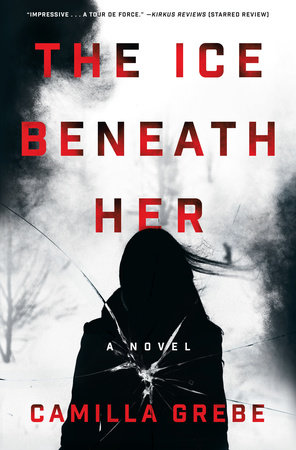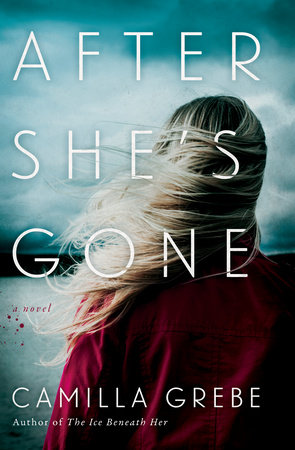Excerpt
The Ice Beneath Her
Chapter 1PeterI’m standing in the snow by my mother’s headstone when I get the call. Her stone is simple, barely knee-high, in rough-hewn granite. We’ve been talking for a while—my mother and I—about how hard it is to be a police officer in this city, where nobody gives a damn about anything but themselves. And—perhaps more important—how hard it is to live in that kind of city, in this kind of time.
I stomp wet snow off my sneakers and turn away from her headstone. It doesn’t feel right to talk on the phone at her grave. The rolling hills of the Woodland Cemetery lay spread out before me. Mist hovers between the tops of tall pines, and beneath it the dark tree trunks shoot up out of the snow like exclamation marks, as if emphasizing life’s transience. There’s dripping from the treetops and from the gravestones. Meltwater runs over everything. It finds its way into my thin shoes, too, collecting around my toes like a wet reminder to buy those boots I have yet to allow myself. Somewhere in the distance I catch a glimpse of dark figures receding into the pine forest. Maybe they’re here to light votive candles or place pine boughs.
Christmas will be here soon.
I take a few steps toward the neatly plowed footpath and throw a glance at the phone screen, even though I already know who it is. The feeling is unmistakable. A sinking, pounding sensation that I know all too well.
Before I answer, I turn back one last time to her headstone. Wave awkwardly and mumble something about coming back soon. It’s unnecessary, of course—she knows I always come back.
The road stretches out black and shining as I drive into the city. The brake lights of other cars glisten in front of me on the road, lighting the way. Thick drifts of dirty brown snow and squat, depressing, conformist buildings line the road to Stockholm. The occasional illuminated Christmas star brightens up a window, like a torch in the night. It’s started snowing again. A rainy slush settles on the windshield, blurring all the edges, softening the landscape. The only sound is the rhythmic swish of the wipers married to the soft purr of the motor.
A murder.
Yet another murder.
Many years ago, back when I was still a rookie homicide detective, getting called to the scene of a murder always provoked a kind of exhilaration. Death was synonymous with a mystery that needed solving, like tangled yarn that needed unraveling. Back then I thought everything could be unraveled and explained. As long as you had the energy, the stamina, and knew which threads to pull and in what order. Reality was nothing more than a complex web of threads.
In short, it could be mastered, figured out.
Now I don’t know anymore. Maybe I’ve lost interest in the web itself, lost my intuition for which thread to pull. Over time, death has taken on new meaning. Mom, resting in the wet ground of the Woodland Cemetery. Annika, my sister, lying in the same cemetery not far away. And Dad, who’s bent on drinking himself to death on the Costa del Sol, will be here soon enough. The crimes that come my way no longer feel as important. Sure, I can help figure out what happened. Put the inconceivable into words—someone had their life taken from them—and describe the events that led up to it. Maybe find the culprit, too, and in the best-case scenario, help to prosecute him. But the dead are still dead, aren’t they? These days, I have difficulty finding meaning in what I do.
By the time I reach Roslagstull dusk is falling, and it occurs to me that it never really got light today. This day passed unnoticed through the same colorless December fog as yesterday and the day before. There’s more traffic once I merge onto the E18 highway heading north. I pass by roadwork, and potholes shake the car so the Little Tree hanging from the rearview mirror jumps alarmingly.
Manfred calls again when I’m driving past the university. Tells me it’s a goddamn mess, some kind of bigwig is involved, and it would be great if I stopped taking so goddamn long and showed up already. I peer out into the cement-gray dusk, tell him to hold his horses, the road has more holes than Swiss cheese, and I’ll bruise my balls if I drive any faster.
Manfred fires off his familiar, grunting laugh, like the snort of a pig. Or maybe I’m being unfair: Manfred is fat; maybe that colors my view of his laugh, makes me think of a voluptuous grunting. Maybe his laugh sounds just like mine.
Maybe we all sound the same.
We’ve been working together for more than ten years, Manfred and me. Year after year, we’ve stood side by side at the autopsy table, interrogating witnesses, and meeting distraught relatives. Year after year, we’ve taken on the bad guys and done our best to make the world a safer place. But have we, really? All those people slumbering in cold storage at Forensic Medicine in Solna are still dead and nothing will change that. Forever and ever. We are no more than society’s cleaning crew, tying up loose ends after the fabric frays and the unthinkable has already happened.
Janet says I’m depressed, but I don’t trust Janet. Besides, I don’t believe in depression. Because that’s how it is: I don’t believe in it. In my case, I’ve just realized the true state of our existence, and I’m looking soberly at life for the first time. Janet says that’s a textbook response, that the depressed person isn’t able to see beyond his own perceived misery. In return I tell her depression is one of the pharmaceutical industry’s most profitable inventions, and I don’t have the time or the desire to make obscenely rich pharmaceutical companies even richer. And if Janet wants to talk more about how I’m feeling after that, I always hang up. After all, we broke up more than fifteen years ago; there’s no need to discuss that kind of thing with her. That she happens to be the mother of my only child doesn’t change that fact.
Albin, by the way, is the child we never should have had. Not because there’s anything wrong with Albin—he’s a normal enough teenage boy: pimply, oversexed, and pathologically interested in computer games—but because I truly wasn’t ready to be a parent. In my darker moments (which are becoming more and more frequent over the years) I think she did it on purpose. Threw away her birth control pills and got pregnant as revenge for that thing with the wedding. Maybe that’s the case. I’ll never know, and it doesn’t really matter now. Albin very much exists, and lives in comfort with his mother. We see each other sometimes, not often—at Christmas and Midsummer and on his birthday. I think it’s best for him if we don’t have much contact. Otherwise, he’d probably end up disappointed with me too.
Sometimes I think I should carry a picture of him in my wallet, like the other (real) parents. A clumsy school picture taken against a sepia-toned panel in a gym by a photographer whose dreams have led no further than the Farsta High School. But then I realize that wouldn’t fool anyone, least of all myself. Parenthood is something you earn, I think. A right that comes from suffering sleepless nights, changing diapers, and all that other stuff you have to do. It has very little to do with genetics, the sperm I unknowingly donated fifteen years ago so Janet could fulfill her dream of being a mother.
I spot the house from a distance. Not because the white, boxy building stands out in any way in this exclusive suburb, but because it’s surrounded by police cars. Blue lights flash across the snow, and the unmistakable white van of the forensic technicians is parked neatly not far away. I park at the bottom of the hill and walk the last stretch up toward the house. Greet the uniforms, flash my badge, and slip under the blue-and-white barrier tape fluttering gently in the breeze.
Manfred Olsson is standing at the front door. His huge body obscures most of the doorway as he raises a hand in greeting. He’s wearing a tweed blazer with a bit of a pink silk scarf poking out of the breast pocket. His generous wool pants are tucked firmly into blue plastic shoe covers.
“Goddamn, Lindgren. I thought you’d never show up.”
I meet his eyes. His small, impish peppercorn eyes are set deeply in his ruddy face. His thin ginger hair is combed neatly in a style that calls to mind an actor in a fifties movie. He looks more like an antiques dealer or a historian or sommelier than a police officer. In fact the last thing he looks like is a cop—something he’s undoubtedly aware of. I suspect it might just be a ploy, that he actually loves exaggerating his eccentric style in order to provoke more hidebound cops.
“Like I said . . .”
“Yeah, yeah. Blame it on the traffic,” Manfred says. “I know how it is when you get hold of a good f***ing porno. Hard to tear yourself away.”
Manfred’s rough language is in sharp contrast to his elaborate and conservative style of dress. He hands me a pair of shoe covers and gloves, and says in a quieter voice:
“Listen. This is some truly f***ed-up shit . . . Come on, see for yourself.”





